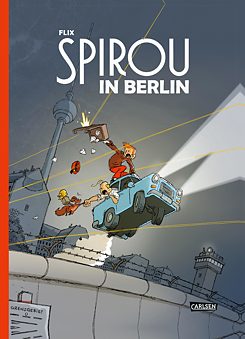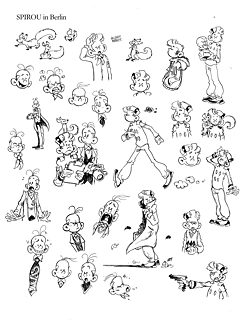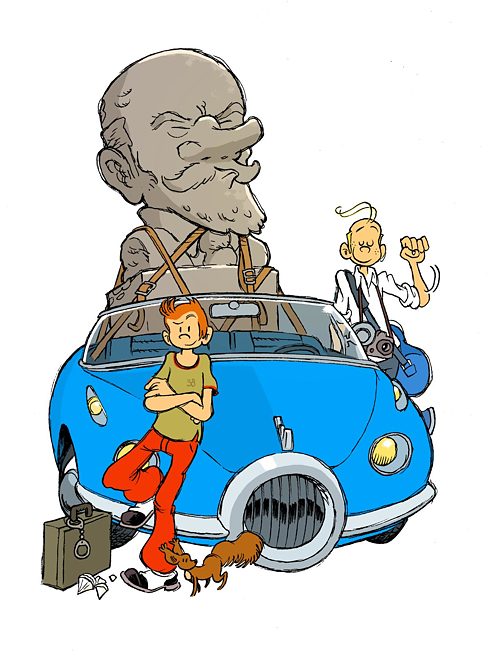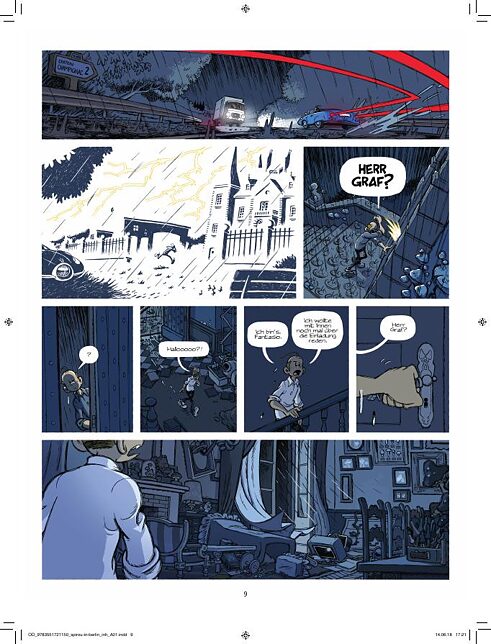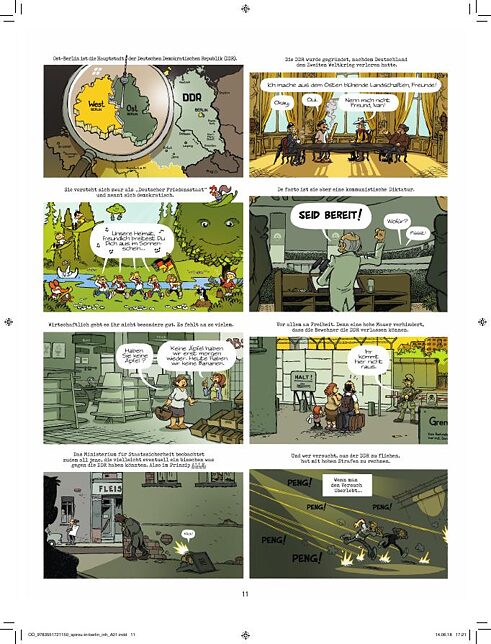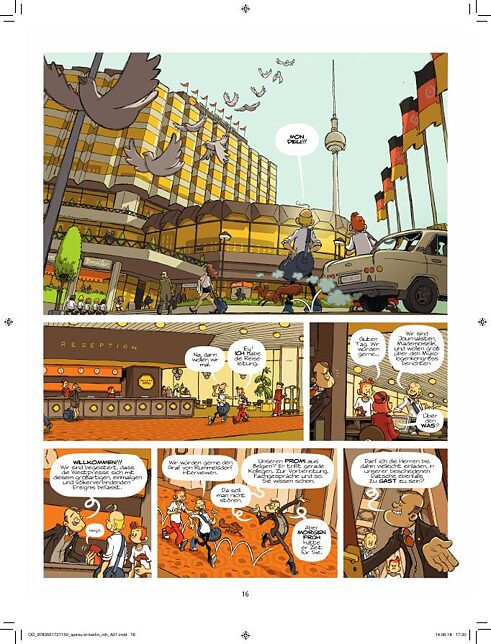Spirou in Berlin
‘All of a sudden you’re playing in the Champions League’
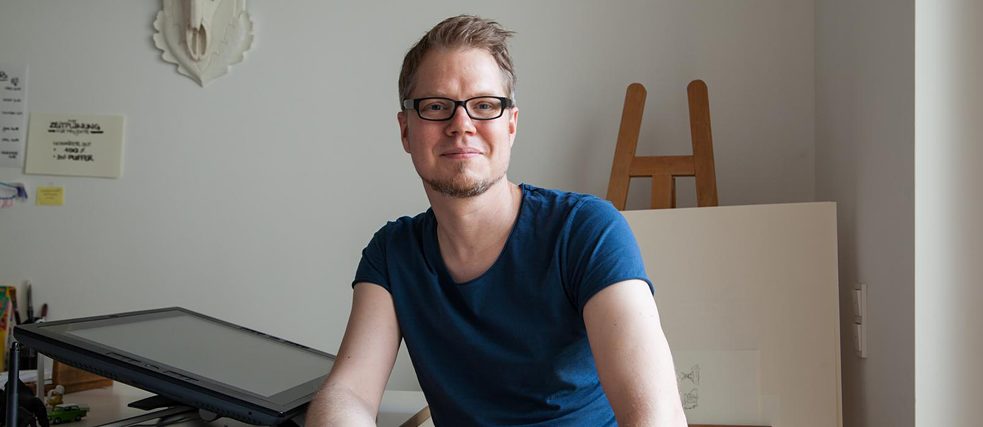
It’s already something of a minor sensation. The Berlin comic strip writer Flix is the first German to have put together an adventure for the Franco-Belgian classic series Spirou. A conversation about comic strip art, tightrope walking and other challenges.
By Ula Brunner
Flix, Spirou is turning 80 and you’ve drawn and written the anniversary edition. What does that feel like, to be such a first?
It’s unbelievable! To work on an issue of Spirou, as great writers like Jijé and Franquin have done before me, was almost surreal: the Franco-Belgian classics are the reason why I became a comic strip artist.
Now, you'll have to tell us more about that!
In the early 80s, as a child, I discovered the corner of the library where the comics were in my home town of Münster. I read them all: Spirou, Lucky Luke, Benni Bärenstark. I thought they were amazing, very funny and I got engrossed in them. I then began to copy and trace them – with a pencil and a colouring pencil on greaseproof paper. I still have a weakness for these soft and dynamic lines.
‘It’s incredible!’
It’s clear to see from Spirou in Berlin that you like the spirited and funny style. Usually, however, the Belgian publisher Les Éditions Dupuis commissions its own artists. How did you come into the frame?It was Dupuis and the Hamburg Carlsen Verlag publishing house that together developed the basic idea of allowing the 80th Spirou adventure to play out in Berlin. Carlsen was looking for a good artist, who was not totally alien to the Franco-Belgian world of comics and who could also come up with a humorous story. When they asked me, I immediately and enthusiastically shouted out ‘Present!’. At the beginning it was still not totally clear if it would really work, that Dupuis would give up a little bit of control of the story.
What was the cooperation like?
It took time to adjust. Dupuis understandably wanted to be sure that my story fitted with the previously established Spirou universe. It turned out to be positive. Belgians take their comics very seriously. For me, it was a challenge to manage the many approval processes and intermediate checks, to manage the workload and to keep calm. Sometimes I thought to myself: André Franquin, one of the best ever comic artists, has done it – and now me! All of a sudden you’re playing in the Champions League and you have to deliver on the pitch. It’s unbelievable.
For one thing, I broke up the page structure: that’s something I generally have fun with. And there’s a slightly romantic moment between Spirou and a resistance fighter from East Berlin. Strong women are not yet widespread in the world of Spirou.
‘Divided Berlin had international relevance’
 © Flix, Carlsen Verlag
© Flix, Carlsen Verlag
That’s true – although Spirou and his friends have turned up in every conceivable corner of the world since the start of the series in 1938. What drew you to East Berlin as the place where the action would take place?
I wanted a subject which necessarily has to be rooted in Berlin. The city was not supposed to be just the setting. Divided Berlin had international relevance and seemed to me to be the right setting for an international series. I then decided to have the story play out shortly before the fall of the wall. This was also to remind people that the opening of borders is a good thing. Europe changed for the better because of that.
The issue plays with the idea of intercultural encounters and finally takes this to an extreme. In the end, the fleeting visit of the Belgian comic hero to East Berlin even triggers the Monday demonstrations!
Yes! (laughs). Spirou basically has a humanistic and peaceful world view. It’s based on compromise in order to change something. And that fits with the idea of the peaceful revolution in the former GDR, where people went around on the streets in Monday demonstrations in order to change something together in a constructive way. I found and I find that to be a good thing.
It’s probably not so easy to strike a balance between the fictional fun of an adventure and staying true to historical facts, is it?
It’s a tightrope walk. I have always thought carefully about how many gags I can and must come up with so that it fits with the character in the series and is still credible. Fortunately, the GDR was a bizarre state and that has a comic element to it. But I also want to show it with its real harshness. I wanted to show both as far is it is possible to do so in 56 pages.
‘It’s a style of possibilities’
The series is regarded as a place to forge talent for Franco-Belgian writers: Jijé, André Franquin, Morvan&Manuera, to name just a few. How do you see yourself in this tradition?I was a guest, I’ve been able to participate once and I have given my all. That is a huge honour and I’m grateful for it. As I said at the outset, the Franco-Belgian school influenced me considerably. I have of course developed further but that was the starting point. I think that the first thing you love as a child makes a mark on you. This softness of the figures – they act as if they had no skeleton and are nonetheless people. They are so agile and lively. And anything can happen at any time as a result. That is the strongest thing about Spirou because the series is done in that way. It is a style of possibilities.
You are very successful as a comic strip author in Germany. But that is much more the exception than the rule. How does the German comic scene compare to the rest of the world?
I have been drawing comics for nearly 20 years and I have the impression that the German scene is growing and becoming more varied. That’s terrific. At the same time the constraints are still clear. Practically no one can live off drawing comic strip alone. It’s particularly tight for teams of people. And so we have many lone warriors. So you have to draw, write and produce. But it’s virtually impossible to be equally good in all these areas. By contrast there are many more teams in France and Belgium. There, comics have a long tradition, they are recognised as an art form and have made it to the heart of society. The print runs are correspondingly large. We also have to find material and methods for publication in Germany in order to reach more people. We know that we can tell good stories. But how do we get readers? That is the challenge.
Gallery
Flix, born 1976, lives in Berlin as an illustrator and comic strip artist who has won many awards. He studied communication design and made his debut with the Carlsen Verlag publishing house with his final dissertation held. Alongside comics with an autobiographic element, he has published several series in newspapers, which were also partly published as book editions (Da war mal was..., Schöne Töchter, Faust and more). His comic Glückskind is currently appearing on a weekly basis in the Frankfurter Allgemeinen Zeitung newspaper. He is the first German artist to produce, with Spirou in Berlin, an issue of the Franco-Belgian comic series.
